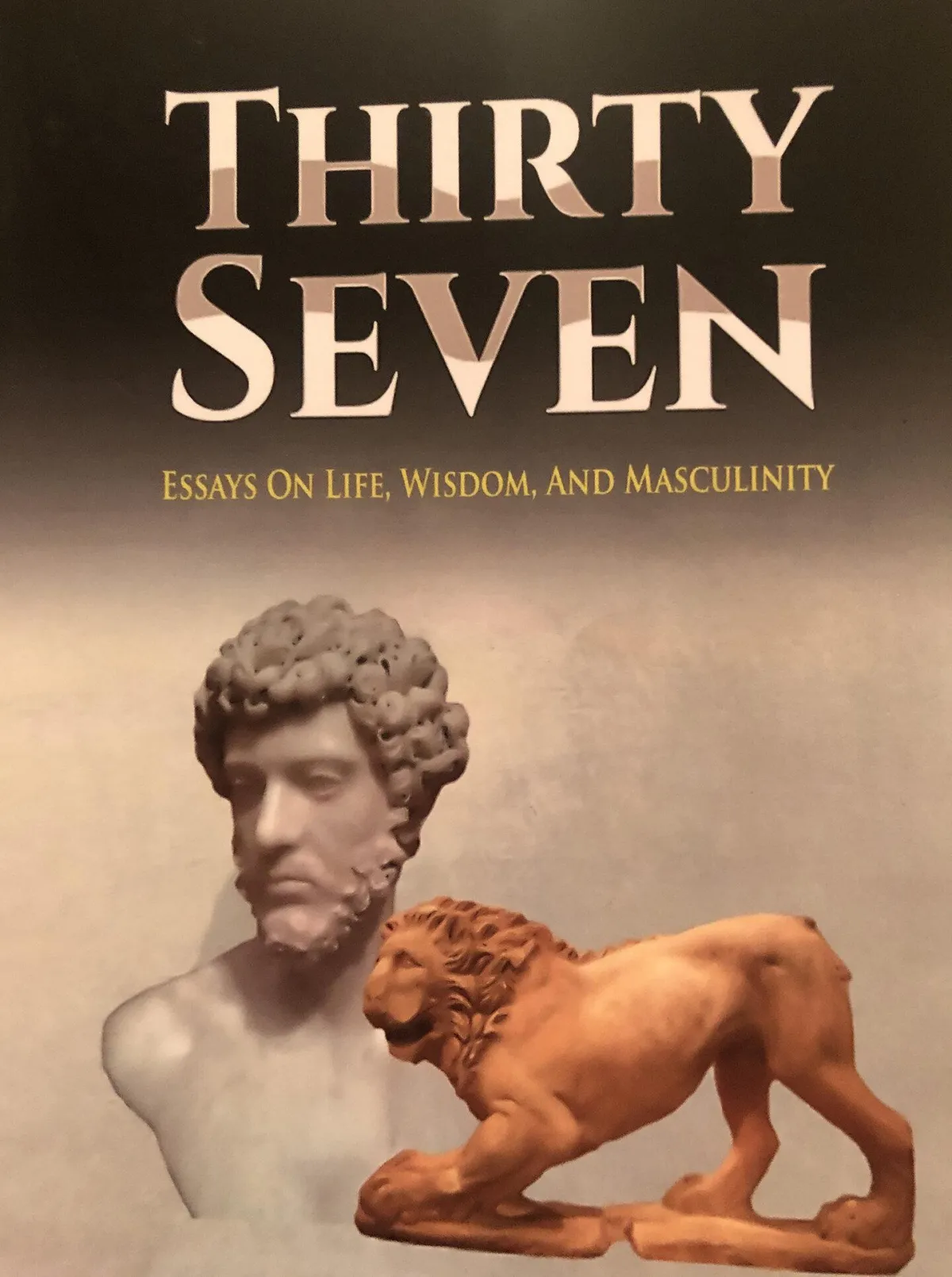
QUINTUS CURTIUS' THIRTY-SEVEN
“The mind is not a vessel to be filled, but a fire to be kindled.”
-Plutarch
For the third and final time, I write a review by an impressive author who utilizes philosophical and

historical examples to impact our lives today. I hope you have been able to partake of his deep thoughts and wisdom. He astutely captures and brings forward learning for anyone who desires to lead.
One of the many valuable essays shared in Thirty Seven, Quintus discusses the value of a quality not frequently spoken of in our many self-help and management books of today: sincerity. Quintus utilizes one of the great thinkers and writers from history to provide a supreme example and dutiful reminder of an often-minimized quality for those of us in positions of power. The sincerity and directness of this individual leader provides an incredible example of this characteristic influence of someone who’s work and writing we are still studying and discussing 1700 years later. The sharing on this topic reminds us of how our ethical and moral approach plays an integral part in the impact we have upon others.
Do you ever wonder what your influence is or whether it will be felt or even remembered when you leave your organization?
Wisdom is explored and possibly gained depending on how much we want to absorb the pages offered. Stories and reminders of discipline, focus, endurance and tenacity abound throughout the chapters. Furthermore, Quintus discusses how pressure reveals the person. There is no avoiding the strains of the situation. We will all have struggles arrive some time in our life. In fact, Quintus wisely shares, “The great struggles of life leave no one unscathed…And as character determines fate, there is no escape from the pitiless confrontation between man and his destiny.” Cancer, the loss of a loved one, the job loss or a myriad of other natural life tragedies will make you consider, if only for a moment, your role and the decision-making in the next step of your impending time ahead. No one can coast through life without experiencing traumas and disasters. Defeats come in personal, financial, or emotional forms. How we deal with will provide some indication of our worth, “No one can shield himself from defeat. It will come whether we want it or not. How we respond to our defeats is the determinative issue. For the laurels go not to the man who begins the race, but to the man who finishes it.”
I wonder, when your time arrives, what person will be revealed?
Many of us desire mastery and position with childlike impatience despite our knowledge of hierarchy and the expected time to “pay our dues.” We may have an immense desire to be known as an expert or someone great in our field. In Thirty-Seven there is a chapter titled “A Great Physician.” It is another very well-done self-contained unit of applicable insight. As stated, it is a reminder that “Greatness is more often the result of years of patient labor than the phosphorescence of a singular incident…Overnight success, someone once said, usually takes about ten years. In fact, it usually takes a lot longer than that…” An ideal reminder to work hard and be patient.
Enemies are good for you. Is that surprising? You have them. It is inexorable. Someone is not going to appreciate your skillset, closeness to the boss, looks, or even your future potential. Accept it. This portion of human nature exists and in others, will never be your friend. Accept it and yet maintain your fairness and equity with all people. Furthermore, use it to improve who you are and what you will accomplish. Quintus shares we can take the actions of our enemies to “harden our sensibilities, and sharpen our cognitive faculties, so that we may be on guard in life’s inevitable struggles.” The resentful and malicious actions of those who dislike and despise us can serve as instruments for our continued upward growth.
The growth can begin with forcing us to watch our own behavior. Our enemies will also teach us to be wary. “Your observations of your enemy will cause you to note his negative qualities; his meanness, cruelty, stupidity, and cowardice. Your increased awareness of these traits will help you to avoid them yourself; our enemies in this way become a form of external regulator. Only a fool will make no effort to learn from his enemies. And if we are honest with ourselves, even an enemy’s criticism may hint at some secret deficiency on our part, and may cause us to redouble our corrective efforts at self-improvement.” Our own ignorance or naïveté will not be an excuse for the lack of awareness to a rival’s actions and the negative consequences we then suffer.
This personal awareness can cause some of the sections to be a little more difficult to read. Not difficult in terms of style or prose, but the inward challenge for self-questioning. The internal reflection which centers upon the part our own actions (or neglect) have played in our downfall or affliction. As Quintus states: “rare is it that some evil befalls us that we did not in some way allow to occur.” Few want to experience the pain of exploring their own fault in this area, but the action for growth is necessary to achieve one’s best version of themself. This requires self-discipline to see the truth by delving into this challenging message, discovering and accepting the part we have played, and utilizing our now heightened awareness to eliminate this defective conduct in the future.
Another unique essay encourages us to consider the part internal perception also plays for a country. It reflects on the fact that countries are like people and have a view of their own worth, capabilities and overall psyche. An enjoyable short essay on how a country responds to national defeat in a sport or major setbacks reflect recovery in the virtues and character traits of perseverance, resilience, and willpower. In fact, “Nations, like individuals, make their own choices on whether to learn from their catastrophic defeat. Some laid low, others have learned from their experiences and gone on to greater achievements, fortified by the gauntlet of hardship. Defeat is a stimulus for reform for some, and a death knell for others. Historical examples abound...”
A key theme throughout all three books is learning from the great ones. Gaining an opportunity for wisdom, strength of character and other qualities we can emulate, incorporate and employ into our own lives. The qualities, decisions, and actions that made each person great. Quintus utilizes the historical perspective to reinforce and remind readers of character, leadership and the virtues that can change a person’s life; the development of character and morals as much as knowledge.
I have attempted a brief summary of three books to encourage you to engage an author who offers an internal and unique approach to growth. We often hear the contemporary thoughts behind today’s ideas for advancement; however, leaders and thinkers of the past offer a view of our world proven by thousands of years of foundational knowledge, success and practical learnings. Learnings for drawing upon the wisdom, character and the common sense of the past in providing the opportunity to think better and be a better leader. Not just about the latest in personal development fads but greater knowledge and insight.
If you like to think, perhaps even deep thoughts, you will find Quintus is an incredibly impressive facilitator for intellectual awareness both philosophically as well as historically. Better yet, he puts his thinking in writing for the rest of us to enjoy and grow. We can apply the learnings to our own lives to be a better leader, perhaps a wiser person and even to share with others. His earnestness/desire to provide his reader with examples and depth to incorporate into our own life come through with every page read. He wants to make us ponder, absorb, lead, and apply it for positive action. Words like strength, dedication, tenacity, and courage, if not always stated directly, are regular reminders of what is necessary to have an impactful life.
Each of the three books is different. They include a running theme on how we can learn from others. Individuals who had mental and physical deficiencies and yet were able to accomplish a great deal. The books also describe how best to handle the inevitable challenges we will all face from determined enemies to those of greatness, and their moral characteristics demonstrated.
It seems we all want to attend the conference, read the book or hear the podcast. Each can provide us with the insight and motivation to perform at a higher level in three easy steps or the magic words to use during strategic negotiations. It still comes back to us as individuals to think, apply and have the self-discipline to take the steps necessary to learn, grow and improve.
Quintus Curtius helps us with some of the answers provided for what a life well-lived looks like.
Tagged: Quintus Curtius, classics, leadership, wisdom, book review
Mindset, Skillset, Peopleset Leadership

